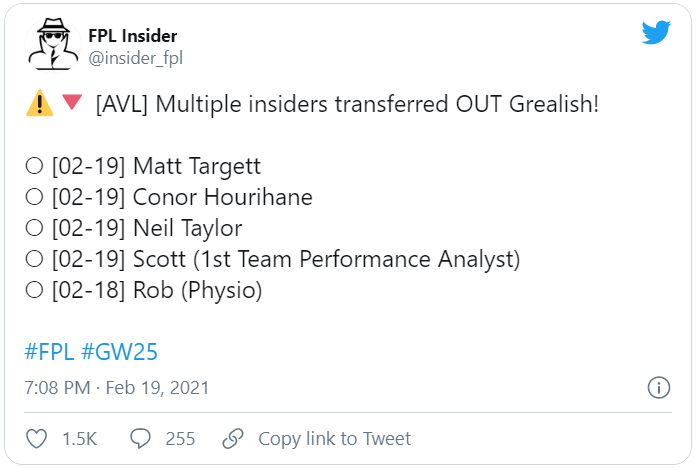Fantasy Premier League: Aston Villa’s ban, integrity issues, and the potential headache for Premier League clubs
With over 7 million participants worldwide, Fantasy Premier League (FPL) is the most popular fantasy football game out there, with users selecting teams from real players and scoring points for goals, assists and clean sheets. Thousands spend their Saturday mornings scrambling to make last-minute decisions on which players to transfer in, who to captain, and whether it’s time to play the ‘Wildcard’.
It all sounds rather innocuous, right?
Well, not according to Aston Villa and their manager Dean Smith. Jack Grealish’s recent omission from Aston Villa's squad to play Leicester has shone a light on a particular issue for Premier League clubs – the unintentional sharing of sensitive player availability information through FPL.
In the days leading up to the Leicester game, Grealish suffered a knock in training and it soon became clear within the Villa camp that he was unlikely to feature that weekend. As a result, three Villa players, their first team performance analyst and one of their physios all transferred Grealish out of their FPL teams.
The problem for Villa (and the other Premier League clubs) is that a number of FPL enthusiasts have created automated software, or “bots”, to monitor the FPL teams of Premier League players and staff and then announce details to the wider public on Twitter:
Villa Manager Dean Smith was less than impressed: “I’ve been made aware that on social media there was some rumours that he wasn’t going to play. If it’s coming out of our training ground, then I’ll find out where it is coming from and reprimand where it’s coming from.”
The very next day, Aston Villa became the first Premier League club to ban their players and staff from participating in FPL.
Are players breaching any existing regulations or contracts by playing FPL?
One of the questions that has arisen is whether the players are in breach of any regulations or contracts by playing FPL and inadvertently releasing sensitive information. We have therefore taken a closer look at the FA's Regulations, the FPL T&Cs and the Standard Premier League Contract:
FA Rules on Inside Information
The FA Rules prohibit players from providing “any information relating to football which the Participant has obtained by virtue of his or her position within the game and which is not publicly available at that time”, but only where such inside information is being used for or in relation to betting.
Clearly, FPL is not “betting”, so players aren’t in breach of the FA Rules relating to inside information by playing FPL.
Standard Premier League Contract
All Premier League players sign up to the same standard Premier League contract when they sign with their club. That standard contract allows for key commercial terms (such as the length of the contract, wages and bonuses etc.) to be negotiated, but it also includes certain mandatory clauses which cannot be changed.
One of the mandatary clauses of the standard Premier League contract (clause 3.2.5) states that: “The Player agrees that he shall not knowingly or recklessly do, write or say anything or omit to do anything which is likely to bring the Club or the game of football into disrepute, cause the Player or the Club to be in breach of the Rules or cause damage to the Club or its officers or employees or any match official”.
One could potentially argue that, by releasing sensitive player availability information through their FPL teams, players are “causing damage to the Club”. In Aston Villa’s case, for example, the club clearly didn’t want Grealish’s injury to be made public – not least because Leicester may have altered their pre-match preparation and tactics.
In reality, however, clubs may not wish to instigate disciplinary proceedings as a result of their players playing FPL, so a more nuanced approach may well be preferable (see below).
FPL T&Cs
The Fantasy Premier League terms and conditions can be found here. On a review, there do not seem to be any restrictions on Premier League players and staff participating in FPL.
Should Premier League players really be playing FPL anyway?
Notwithstanding the fact that players are unlikely to be in breach of any regulations or contracts, one might question whether Premier League players should really be playing FPL at all.
From an integrity and transparency perspective, there is certainly an argument that Premier League players shouldn’t have a vested interest in their opponent’s success (however small it may be). Let’s take an extreme example: if a Premier League player is playing against Spurs at the weekend and isn’t particularly confident about his team’s defensive capabilities, should that player be triple captaining Harry Kane?
Parallels can be drawn with the FA’s betting rules which strictly prohibit players from betting on football. Even though FPL (which doesn’t have financial incentives) clearly isn’t as serious as betting, the same principles of integrity are arguably just as applicable.
So, what can clubs do about it?
Well, Aston Villa seem to have provided the most straight-forward answer: use internal policies to impose a complete ban on FPL.
All Premier League clubs will already have robust social media policies in place, but it may now seem sensible for all clubs to follow Villa's lead and expressly ban their players and staff from participating in FPL.
Whilst such a move may seem somewhat draconian, the Villa situation has shone a light on the current state of play and it’s likely that other clubs will now follow suit.

